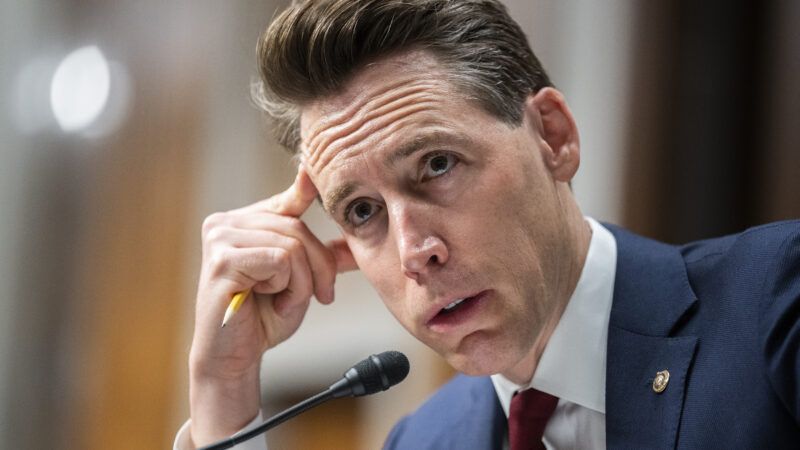Josh Hawley Targets Disney With Copyright Legislation
Despite the senator's clear culture war animus, there are things to like about his bill.

On Tuesday, Sen. Josh Hawley (R–Mo.) introduced legislation that he hopes will "open up a new era of creativity and innovation." Despite some problems with the bill and a clear ulterior motive, he may get his wish.
Hawley's bill, the Copyright Clause Restoration Act of 2022, would shorten the period of time that a creative work can be copyrighted. Currently, any creation is protected for its creator's entire life plus 70 years; works created prior to 1978 are protected for 95 years. Hawley's bill would shorten that period to 28 years, with the option to renew at the end of that term for a limit of 56 years total. While this would be a significant decrease, it is no radical shift: The exact same terms were in place from 1909 up until 1976. Plus, shortening the terms brings the law closer to the actual stated constitutional purpose of copyrights—encouraging innovation rather than simply protecting stakeholders' financial interests.
But Hawley's bill has some shortcomings as well, and they stem from his messaging campaign. The press release announcing the bill singles out The Walt Disney Company by name and quotes Hawley as saying, "Thanks to special copyright protections from Congress, woke corporations like Disney have earned billions while increasingly pandering to woke activists. It's time to take away Disney's special privileges and open up a new era of creativity and innovation."
This isn't the first time Republicans have threatened Disney: House Republicans made a similar threat last month, attempting to punish the company for its "new far left agenda." At the urging of Gov. Ron DeSantis, Florida Republicans stripped Walt Disney World, the company's largest theme park, of the special district status that allows it to govern itself. All of these acts and threats came in direct response to Disney's belated criticism of Florida's Parental Rights in Education law, which opponents have termed the "Don't Say Gay" bill over its ban on discussions of gender identity and sexual orientation in public schools.
But Hawley's criticism is incoherent. It's true that Disney has lobbied for and benefited from extremely generous extensions to copyright terms over the years, such that it has owned the exclusive rights to some of its characters for nearly a century. But these were not "special copyright protections"—just copyright protections. They apply to Disney characters like Mickey Mouse and Goofy, but they also applied to works like The Great Gatsby, which only just entered the public domain last year, more than 80 years after the author's death.
Hawley's bill takes aim at Disney as specifically as it can, making the new terms retroactive for any company with a market capitalization of more than $150 billion and classified as either Motion Picture and Video Industries or Arts, Entertainment and Recreation. There are very few companies that fit both criteria: The only other one of that size, Amazon, has only been creating original content for nine years. Also, the bill's specific parameters would exclude book and music publishers for no discernible reason other than Hawley's personal animus for Disney.
But despite these issues, there is much to like about Hawley's bill: Yes, it would immediately deprive Disney of the exclusive rights to some films featuring characters like Mickey Mouse,* but it would do so by taking copyright terms back to what existed when Mickey Mouse was created. If the parameters specific to Disney could be removed, it would open up a new era of creativity almost overnight in which people could use and reuse older media that audiences are familiar with.
*Correction: This article has been updated to correct a misstatement regarding the possible results of Hawley's bill.

Show Comments (164)